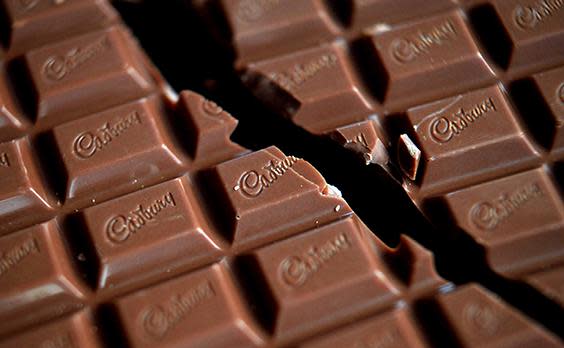Cadbury forced to explain why its chocolate is halal after being accused of 'Muslim appeasement'

Cadbury has been forced to respond to furious customers after an old picture surfaced online indicating that its chocolate Easter eggs in the UK are halal certified.
Customers anger was sparked after the picture, which appears to have been taken in 2014, of a Cadbury’s employee holding a certificate showing its products are halal-certified surfaced on social media with the caption: “Cadbury proudly displaying their latest new halal certificates, pass it on.”
As soon as the image was re-shared on Twitter some customers accused the brand of “Muslim appeasement” while other threatened to boycott it all together.
Cadburys proudly displaying their HALAL certificate while sales drop as many boycott pic.twitter.com/7f9780otXK
— Lesley Miller (@LesleyMillercyp) March 18, 2017
The English Defence League on its Facebook page also encouraged its followers to boycott Cadbury’s products.
@LesleyMillercyp so gone from a product with a christian Quaker background to a muslim appeasement society.I rufuse to buy cadbury chocolate
— russell hillman (@heatmeterman) March 19, 2017
As a result, Cadbury responded to the fierce reaction by explaining:
“None of our UK products are halal certified and we have never made any changes to our chocolate to specifically make them halal.”
"They are just suitable for those following a halal diet in the same way that standard food such as bread or water.”
#PrayForCadbury @CadburyUK pic.twitter.com/nbzkG28bMO
— Easter®Watch (@EasterWatch) March 20, 2017
In a separate statement a spokesperson for Mondelez, which owns Cadbury, said: “In the UK our chocolate products are suitable for vegetarians and those following a halal diet, however they are not Halal certified. As our chocolate products do not contain meat, the ritual of halal does not apply and in the UK carry no halal certifications of any kind. The only animal related products we use in our British chocolate are milk and eggs. We take care to point out if and when our products are suitable for certain sections of society who take an interest in the ingredients and manufacturing process.
“Elsewhere in the world, we may label products with any number of certifications based on consumer interest and dietary requirements, and the best place for consumers to find that information is on the product label in that country. However, Cadbury welcomes consumers of all faiths and none.”
Under Sharia law, or Islamic law, products that contain pork are not considered halal, and so should not be consumed by Muslims.
The image appears to originate from the firm’s Asia-Pacific market.
In 2014, Islamic authorities in Malaysia confirmed Cadbury chocolate had been found not to contain pork DNA after concerns were raised about whether the company’s chocolate contained pig DNA,

 Yahoo Finance
Yahoo Finance 